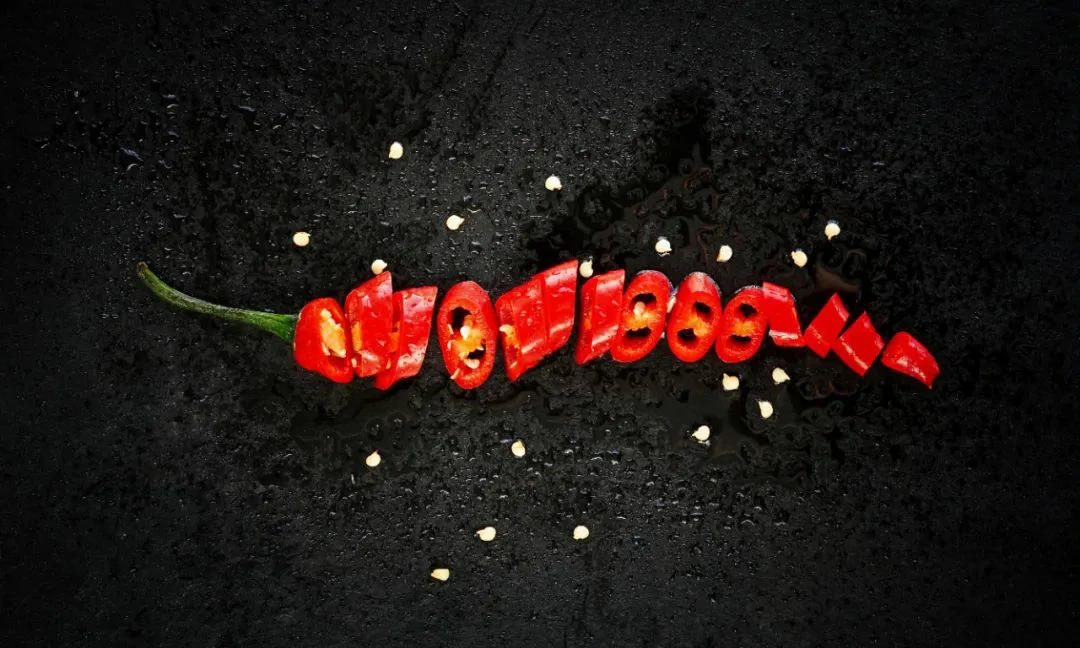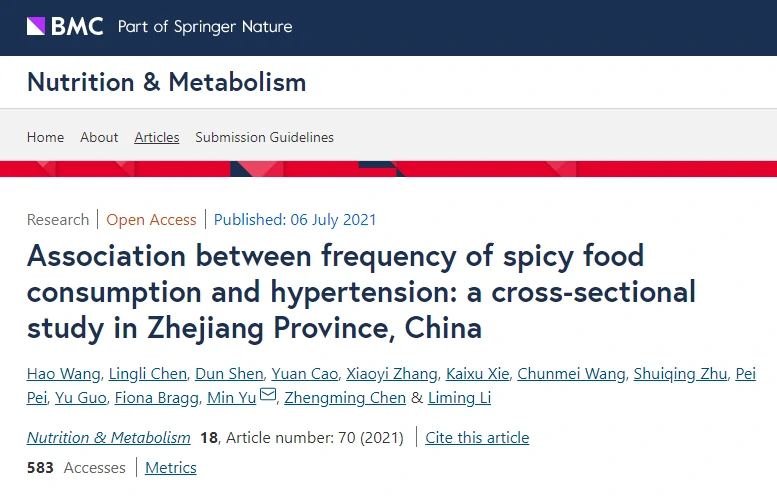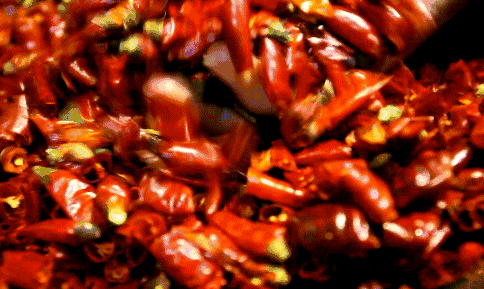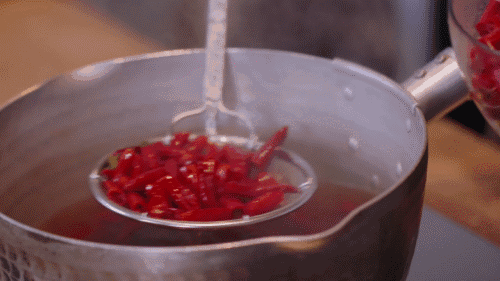Women who eat spicily often have a lower risk of high blood pressure
“Spicy”, a taste that can directly hit the soul, is actually a burning sensation in the body. Eating spicy food is not only good for mouth addiction, but also good for health: new research finds that eating spicy food regularly can prevent high blood pressure.

Eating spicy food often reduces the risk of high blood pressure
Recently, Li Liming and others from the School of Public Health of Peking University analyzed the data of nearly 54,000 people in Tongxiang, Zhejiang Province in the China Chronic Disease Perspective Research Project and found that eating spicy food can prevent high blood pressure, but this phenomenon is only seen in women.

The study included 53,916 adults aged 30 to 79, of whom 44.4% had high blood pressure and 12.3% ate spicy food at least once a week.
After adjusting for potential confounding factors such as sociodemographic status, lifestyle factors, body mass index, waist circumference, sleep duration, and snoring, among women, eating spicy food 1–2 times per week and greater than Three times, the risk of developing high blood pressure was reduced by 10% and 12%, respectively. The more times women ate spicy food per week, the more significant the decrease in systolic and diastolic blood pressure.
For men, there was no significant difference in the risk of hypertension and systolic and diastolic blood pressure levels according to the number of times spicy food was consumed per week.
Among those who drank alcohol, those who ate spicy food daily had only a 2% lower risk of developing high blood pressure compared with those who never ate spicy food; but among those who did not drink alcohol, those who ate spicy food daily had a 28% lower risk of high blood pressure %. After excluding 1128 patients with a diagnosis of gastric ulcer, the inverse association between the number of spicy meals per week and the risk of hypertension remained.

The researchers pointed out that the specific mechanism of eating spicy food to reduce the risk of high blood pressure is still unclear, and the possible reason may be related to the capsaicin contained in red peppers.
Eating spicy food is a kind of “benign masochism”
Spicy is not a taste, but a “painful feeling”. Since chili is painful, why do people enjoy it so much?
This may be related to “benign masochism,” which refers to people enjoying negative experiences that the body or brain misinterprets as a threat. Once the real danger is realized, the difference in cognitive and physical responses leads to a The pleasant excitement of people can also be understood as a kind of “adventure”.
The fear of bungee jumping, the fear of watching horror movies, the thrill of riding a roller coaster, the bitterness of tasting coffee, the pain of feeling massage, etc., can all be said to be a kind of “benign masochism”.
This may be a mechanism of self-preservation, regularly experiencing manageable danger, and may help us survive when we are actually faced with a threat because of the ability to cope better with repeated practice in the past.
Eating spicy food is not just as simple as a mouthful. Chili can not only promote the secretion of digestive juice, increase appetite, but also help health:
vitamin supplement
Chili peppers are rich in vitamin A, vitamin C, vitamin E, vitamin K, B vitamins, carotene, folic acid, and other vitamins, as well as minerals such as calcium and iron, and dietary fiber.
Pain relief and heat dissipation
Chili can reduce body temperature through sweating, relieve muscle pain, and have auxiliary antipyretic and analgesic effects. American studies have found that capsaicin can reduce the neurotransmitters that convey pain and reduce pain.
Promote blood circulation
Chinese medicine believes that chili peppers have certain medicinal properties, which can “perspire, remove phlegm, and dehumidify”. Modern medicine believes that pepper can promote blood circulation and prevent frostbite.
Relieve stress
The stimuli of spicy will prompt the body to secrete a lot of endorphins, which makes people feel happy and euphoric.

Improve skin
Chili can promote hormone secretion in the body and improve skin conditions. Acne is not a problem with peppers. Only if you have a physique that loves acne, it will add fuel to the fire after eating peppers.
Help prevent cancer
An analysis of chronic prospective studies in China showed that compared with those who never or rarely ate spicy food, those who ate spicy food every month had a 12% lower risk of esophageal cancer; those who ate spicy food 1-2 days a week had a 24% lower risk of esophageal cancer.
Helps reduce mortality
A US study found that compared with people who rarely or never eat spicy food, those who eat spicy food have a 26% relative reduction in cardiovascular disease mortality; a 23% relative reduction in cancer mortality; and a 25% relative reduction in all-cause mortality.
4 things to eat healthy and spicy
Although it is good to eat spicy food, it should not be blind. When you eat it, do the following 4 things well to add points to your health.
Grasp the spiciness
When the spiciness is obviously beyond the body’s capacity, the body will excrete capsaicin as soon as possible through diarrhea and vomiting, and once the spiciness is too high, the joy of eating spicy food may be less than the pain, so eat spicy food according to your ability.
Choose the right food
You can choose fresh peppers, which are more nutritious, and after high-temperature cooking, the spicy taste will be reduced.
Match with cool foods, such as duck, fish, bitter gourd, lotus root, tofu, lettuce, etc.;
Coarse grains such as corn or sweet potatoes are rich in dietary fiber, which can prevent constipation caused by heat in the stomach;
Drink more water or soup to avoid dry throat and cleft lips, you can choose chrysanthemum tea;
Eating some sour fruits, such as apples, pears, pomegranates, bananas, hawthorn, grapes, etc., can stimulate the secretion of digestive juice and accelerate gastrointestinal motility.

Several types of people avoid spicy food
Patients with cardiovascular and cerebrovascular diseases, gastrointestinal diseases, hyperthyroidism, constipation, eye diseases, oral ulcers, etc., should try to avoid spicy food.
Two tricks to help you unwind
If you are “spicy”, you can drink some milk. The casein in it can wrap up the capsaicin and take it away, which can have a good anti-spicy effect.
If there are too many peppers when cooking, you may wish to add some vinegar. When eating in a restaurant, if you feel that the dish is spicy, you can also have a small dish of vinegar dipped in it. The acetic acid in vinegar neutralizes the spiciness and reduces irritation.